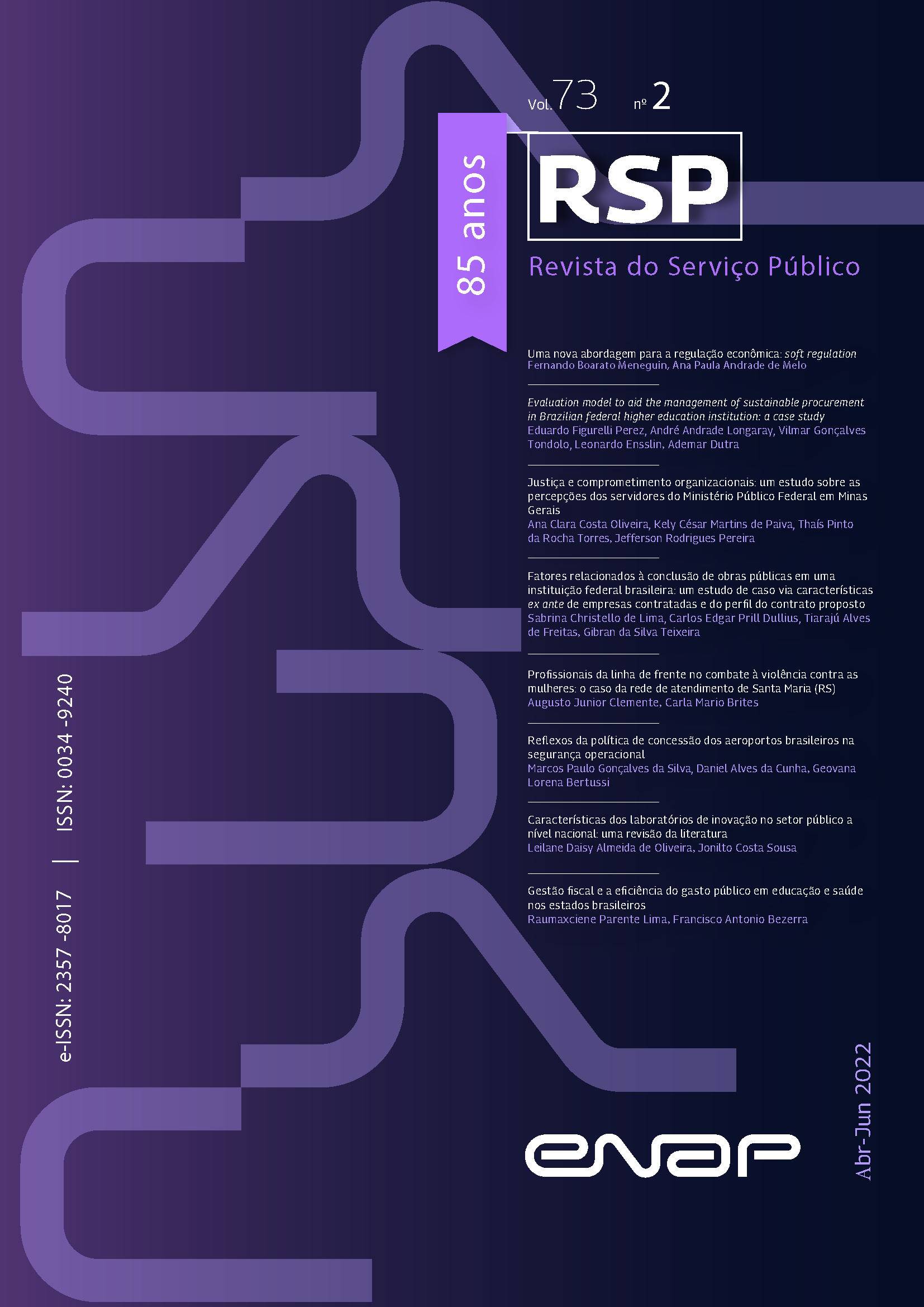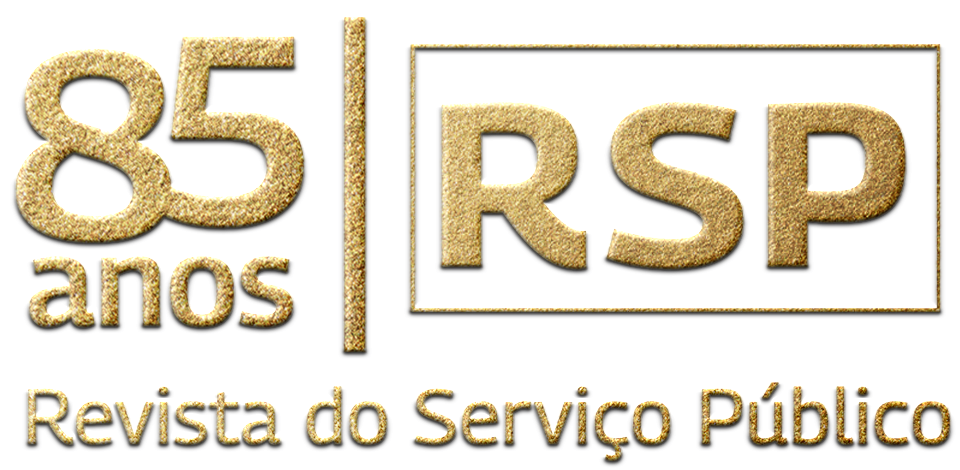A new approach to economic regulation: soft regulation
Keywords:
soft regulation; regulatory impact analysis; alternatives to traditional regulation; economic freedom; institutional matrixAbstract
This text proposes a debate about a new approach to state intervention through alternatives other than traditional ones. The objective is to define a concept of soft regulation, identify applications and advantages of this choice, so that it can be applied in an institutionalized way in Brazil, aiming to promote the improvement of regulatory performance, without interfering too much in the functioning of society and the market. It is expected to bring to light new possibilities of intervention that contribute to the
efficiency and effectiveness of actions, in order to help increase the rationality of the country’s regulatory system and institutional matrix. The methodology used was documental and bibliographic research. As a result, it is expected to raise the discussion about the use of soft alternatives to be considered as an option to face a regulatory problem.
Downloads
References
ACEMOGLU, D.; ROBINSON, J. The role of institutions in growth and development. Working Paper n. 10. Washington, DC: World Bank – Commission on Growth and Development, 2008.
ARANHA, M. I. Manual de Direito regulatório: fundamentos de Direito regulatório. Scotts Valley: CreateSpace, 2013.
ARANHA, M. I. et al. Estudo sobre conformação regulamentar apoiada em modelagem regulatória por incentivos: relatório técnico. Brasília: Centro de Políticas, Direito, Economia e Tecnologias das Comunicações / UnB, 2020. Disponível em: https://sei.anatel.gov.br/sei/modulos/pesquisa/md_pesq_documento_consulta_externa.php?eEP-wqk1skrd8hSlk5Z3rN4EVg9uLJqrLYJw_9INcO7Hks0VzNfpQoGpTDKy7bK3IIpWxpGl-WyEsckHAkOABxCpcpkhkOoWrtmbB8xE5vR82yRaSP8Rez1EN_G1zoi8. Acesso em: 22 mar. 2021.
BRASIL. Advocacia-Geral da União (AGU). Manual de boas práticas regulatórias. 2018. Disponível em: https://drive.google.com/file/d/1lKjBXT7WQpXWAdM_3xZClsD-BnqvU8-X/view. Acesso em: 28 mar. 2021.
______. Ministério da Economia. Guia orientativo para elaboração de análise de impacto regulatório (AIR). Brasília: Presidência da República, 2021. Disponível em: https://www.gov.br/economia/pt-br/acesso-a-informacao/reg/guias-e-manuais/referencias-e-bibliografia-guia-air/guia-de-air_vfinal_150421.pdf. Acesso em: 21 abr. 2021.
______. Ministério da Justiça e Segurança Pública. Conselho Administrativo de Defesa Econômica. Guia para programas de compliance. 2016. Disponível em: https://cdn.cade.gov.br/Portal/centrais-de-conteudo/publicacoes/guias-do-cade/guia-compliance-versao-oficial.pdf. Acesso em: 5 out. 2020.
COASE, Ronald. The firm, the market and the law. Chicago: University of Chicago Press, 1988.
CORVAGLIA, M. A.; MASCHNER, L. The complementarity of soft and hard law in public procurement: between harmonization and resilience. Working Paper nº 2013/10. NCCR Trade Regulation, 2013. Disponível em: https://www.wti.org/media/filer_public/38/da/38dafd82-ad21-4690-b23e-9ccedb4a559d/nccr-wp_asil_paper_macorvaglia.pdf. Acesso em: 11 set. 2021.
GUNNINGHAM, N. Enforcement and compliance strategies. The Oxford handbook of regulation, v. 120, p. 131-135, 2010.
HALLSWORTH, M.; EGAN, M.; RUTTER, J.; MCCRAE, J. Behavioural government: using behavioural science to improve how governments make decisions. Reino Unido: The Behavioural Insights Team, 2018.
KASA, S.; WESTSKOG, H.; ROSE, L. E. Municipalities as frontrunners in mitigation of climate change: does soft regulation make a difference? Environmental Policy and Governance, v. 28, p. 98-113, 2018.
KOUTALAKIS, C.; BUZOGANY, A.; BORZEL, T. A. When soft regulation is not enough: the integrated pollution prevention and control directive of the European Union. Regulation and Governance, v. 4, n. 3, p. 329–344, 2010.
KURUVILLA, S.; VERMA, A. International labor standards, soft regulation, and national government roles. Journal of Industrial Relations, v. 48, n. 1, p. 41-58, 2006. Disponível em: https://doi.org/10.1177/0022185606059313. Acesso em: 29 mar. 2021.
LUO, Y.; IYENGAR, G., VENKATASUBRAMANIAN, V. Soft regulation with crowd recommendation: coordinating self-interested agents in sociotechnical systems under imperfect information. Public Library of Science - PLoS ONE,v. 11, n. 3, e0150343, mar. 2016. Disponível em: https://journals.plos.org/plosone/article?id=10.1371/journal.pone.0150343. Acesso em: 14 mar. 2021.
LUNN, P. Regulatory policy and behavioural economics. OECD Publishing, 2014. Disponível em: https://read.oecd-ilibrary.org/governance/regulatory-policy-and-behavioural-economics_9789264207851-en. Acesso em: 12 set. 2021.
MÉLO FILHO, M. A. Da regulação responsiva à regulação inteligente: uma análise crítica do desenho regulatório do setor de transporte ferroviário de cargas no Brasil. Journal of Law and Regulation, [S. l.], v. 6, n. 1, p. 144-163, 2020. Disponível em: https://periodicos.unb.br/index.php/rdsr/article/view/31093/25891. Acesso em: 25 set. 2021.
MENDES, G. F. O ordenamento jurídico brasileiro e o instituto da consolidação. In: ASSEMBLÉIA LEGISLATIVA DO ESTADO DE MINAS GERAIS. A consolidação das leis e o aperfeiçoamento da democracia. Belo Horizonte: Assembléia Legislativa do Estado de Minas Gerais, 2003. p. 57-71.
MENEGUIN, F. B. A análise de impacto regulatório e o aprimoramento das normas. In: YEUNG, L. (org.). Análise econômica do Direito – temas contemporâneos. São Paulo: Actual, 2020.
MENEGUIN, F. B.; SAAB, F. Análise de impacto regulatório: perspectivas a partir da Lei da Liberdade Econômica. Texto para Discussão nº 271. Brasília: Núcleo de Estudos e Pesquisas/CONLEG/Senado, fev. 2020
MENEGUIN, F. B.; MELO, A. P. A. Análise de impacto para além das regulações. Texto para discussão nº 286. Brasília: Núcleo de Estudos e Pesquisas/CONLEG/SENADO, out. 2020.
MISALE, G. T. C. Programas de compliance à luz do ordenamento concorrencial brasileiro: instrumentos de conformidade para a política anticartel. 2019. 395 f. Dissertação (Mestrado) – Programa de Pós-Graduação em Direito, Faculdade de Direito, Universidade de São Paulo, São Paulo, 2019.
NEIVA, M. M. Análise jurídica do segundo Acordo da Basiléia: a regulação do mercado bancário internacional por meio de instrumentos de soft law e sua legitimidade democrática. 2008. 191 f. Dissertação (Mestrado em Direito) – Faculdade de Direito da Universidade de Brasília, Brasília, 2008.
NORTH, D. C. Institutions, institutional change and economic performance. Cambridge: Cambridge University Press, 1990.
ORGANIZAÇÃO PARA A COOPERAÇÃO E DESENVOLVIMENTO ECONÔMICO (OECD). OECD Regulatory Policy Division. Alternatives to traditional regulation. OECD Report. s.d. Disponível em: https://www.oecd.org/gov/regulatory-policy/42245468.pdf. Acesso em: 18 mar. 2021.
OLIVEIRA, A. F. de. Papo reto: vale a pena investir em programas de compliance antitruste no Brasil? WebAdvocacy, Brasília, n. 1, 2 mar. 2021. Disponível em: https://webadvocacy.com.br/wp-content/uploads/2021/04/WEBADVOCACY-marco-2021.pdf. Acesso em: 4 mar. 2021.
OLIVEIRA, R. C. R. Novo perfil da regulação estatal: administração pública de resultados e análise de impacto regulatório. Rio de Janeiro: Forense, 2015.
OLKKONEN, L.; QUARSHIE, A. The public sector: hard and soft regulation. In: OLKKONEN, L.; QUARSHIE, A. Corporate social responsibility in Finland: origins, characteristics, and trends. Cham: Palgrave Pivot, 2019. p. 37-43.
PELTZMAN, S. Regulation and the wealth of nations: the connection between government regulation and economic progress. New Perspectives on Political Economy, v. 3, n. 3, p. 185-204, 2007.
RAMAJOLI, M. Self regulation, soft regulation e hard regulation nei mercati finanziari. Rivista della Regolazione dei mercati, Fascicolo 2, p. 53-71, 2016.
SENDEN, L. Soft law, self-regulation and co-regulation in European law: where do they meet? Electronic Journal of Comparative Law, v. 9, n. 1, p. 1-27, jan. 2005. Disponível em: https://papers.ssrn.com/sol3/papers.cfm?abstract_id=943063. Acesso em: 18 mar. 2021.
SHAFFER, G.; POLLACK, M. A. Hard vs. Soft Law: alternatives, complements and antagonists in international governance. Minnesota Law Review, v. 94, p. 706-799, 2009.
TRUBEK, D.M.; TRUBEK, L. G. Hard and soft law in the construction of social Europe: the role of the open method of co-ordination. European Law Journal, v, 11, p. 343-364, 2005.
Downloads
Published
How to Cite
Issue
Section
License
Copyright (c) 2022 Revista do Serviço Público

This work is licensed under a Creative Commons Attribution-NonCommercial-ShareAlike 4.0 International License.
- A RSP adota a licença Creative Commons (CC) do tipo Atribuição – Uso Não-Comercial (BY-NC).
- A licença permite que outros remixem, adaptem e criem obra licenciada, sendo proibido o uso com fins comerciais.
- As novas obras devem fazer referência ao autor nos créditos e não podem ser usadas com fins comerciais, porém não precisam ser licenciadas sob os mesmos termos dessa licença.
- Ao publicar o artigo na RSP, o autor cede e transfere para a ENAP os direitos autorais patrimoniais referentes ao artigo.
- O artigo publicado na RSP não poderá ser divulgado em outro meio sem a devida referência à publicação de origem.
- O autor que tiver o artigo publicado na RSP deverá assinar o Termo de Concessão de Direitos Autorais (em momento oportuno a editoria da Revista entrará em contato com o autor para assinatura do Termo).



